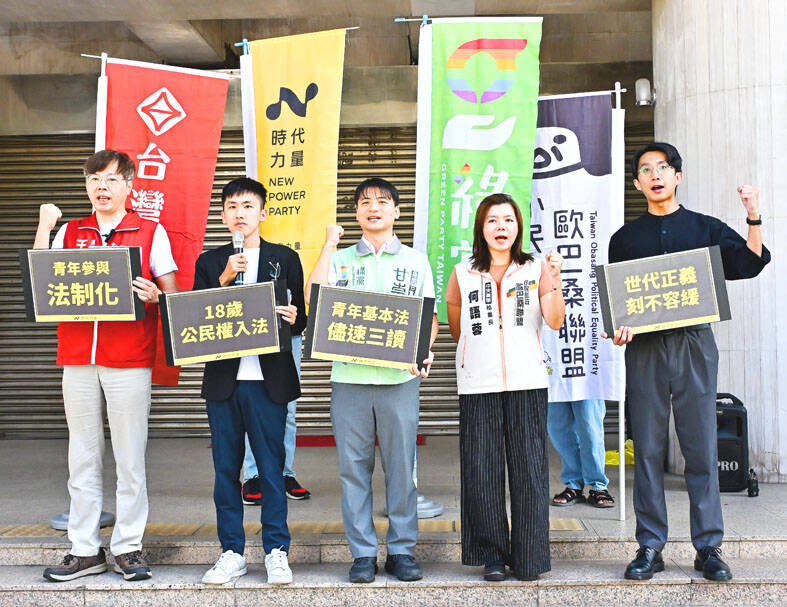Four minor opposition parties, alongside the Better Together for NextGen Taiwan organization, yesterday urged a speedy and rational review of a draft youth basic act, ensuring the law would become the principal legislation for youth-related policies, as the legislature’s Education and Culture Committee conducted an item-by-item review of the draft act.
Taiwan is suffering intergenerational injustice in politics, as highlighted by the rapid passage of the Act Promoting Development for Strong Generation Policies and Industries (壯世代政策與產業發展促進法) proposed by then-Taiwan People’s Party (TPP) legislator Wu Chun-cheng (吳春城) last year, New Power Party deputy secretary-general Liu Pin-chen (劉品辰) said.
The act gives the older “strong generation” more power, resources and the right to speak out over young people or the so-called sandwich generation, Liu said.

Photo: Chen Chih-chu, Taipei Times
The legislature should pass the youth basic act with the same gusto it passed the “strong generation” act, Liu said.
People who are 18 years old are eligible to serve their mandatory military service, pay taxes and shoulder other obligations, yet they cannot vote outside of referendums, Liu said, adding that this is an injustice.
Taiwan Statebuilding Party Chairman Wang Hsing-huan (王興煥) said that the party supports the bill, as it would guarantee that youth rights are a part of basic law.
The party supports the legislation, as it ensures that youth rights would be considered when forming policy, and that governments across all levels would have a bureaucratic system for youth affairs, Wang said.
The party also wants to allow people to vote when they reach the age of 18, and to establish a local youth democracy review committee that would allow young people to countersign any local legislation being passed, he said.
Taiwan Obasang Political Equality Party secretary-general Ho Yu-jung (何語蓉) said youth participation mechanics are only skin-deep and the act, if passed, would grant a legal basis for youth rights and obligations.
Green Party Taiwan general convener Kan Chung-wei (甘崇緯) said the party supports writing into the act the rights that 18-year-olds should enjoy, adding that youth participation is necessary for democracy to continue.
Better Together for NextGen Taiwan secretary-general Huang Chung-hsien (黃種賢) said that all problems pertaining to young people are intergenerational, adding that young people are not some form of sub-adults and are active members of society.
Huang said young people’s capabilities and autonomy should be acknowledged, and that youth participation is necessary for Taiwanese society.
The term “strong generation” refers to the generation born after World War II, aged 55 or older.

Taiwan has received more than US$70 million in royalties as of the end of last year from developing the F-16V jet as countries worldwide purchase or upgrade to this popular model, government and military officials said on Saturday. Taiwan funded the development of the F-16V jet and ended up the sole investor as other countries withdrew from the program. Now the F-16V is increasingly popular and countries must pay Taiwan a percentage in royalties when they purchase new F-16V aircraft or upgrade older F-16 models. The next five years are expected to be the peak for these royalties, with Taiwan potentially earning

POSITIVE DEVELOPMENT: Japan and the US are expected to hold in-depth discussions on Taiwan-related issues during the meeting next month, Japanese sources said The holding of a Japan-US leaders’ meeting ahead of US President Donald Trump’s visit to China is positive news for Taiwan, former Japan-Taiwan Exchange Association representative Hiroyasu Izumi said yesterday. After the Liberal Democratic Party’s landslide victory in Japan’s House of Representatives election, Japanese Prime Minister Sanae Takaichi is scheduled to visit the US next month, where she is to meet with Trump ahead of the US president’s planned visit to China from March 31 to April 2 for a meeting with Chinese President Xi Jinping (習近平). Japan and the US are expected to hold in-depth discussions on Taiwan-related issues during the

‘LIKE-MINDED PARTNER’: Tako van Popta said it would be inappropriate to delay signing the deal with Taiwan because of China, adding he would promote the issue Canadian senators have stressed Taiwan’s importance for international trade and expressed enthusiasm for ensuring the Taiwan-Canada trade cooperation framework agreement is implemented this year. Representative to Canada Harry Tseng (曾厚仁) in an interview with the Central News Agency (CNA) said he was increasingly uneasy about Ottawa’s delays in signing the agreement, especially as Ottawa has warmed toward Beijing. There are “no negotiations left. Not only [is it] initialed, we have three versions of the text ready: English, French and Mandarin,” Tseng said. “That tells you how close we are to the final signature.” Tseng said that he hoped Canadian Prime Minister Mark Carney

STAY IN YOUR LANE: As the US and Israel attack Iran, the ministry has warned China not to overstep by including Taiwanese citizens in its evacuation orders The Ministry of Foreign Affairs (MOFA) yesterday rebuked a statement by China’s embassy in Israel that it would evacuate Taiwanese holders of Chinese travel documents from Israel amid the latter’s escalating conflict with Iran. Tensions have risen across the Middle East in the wake of US and Israeli airstrikes on Iran beginning Saturday. China subsequently issued an evacuation notice for its citizens. In a news release, the Chinese embassy in Israel said holders of “Taiwan compatriot permits (台胞證)” issued to Taiwanese nationals by Chinese authorities for travel to China — could register for evacuation to Egypt. In Taipei, the ministry yesterday said Taiwan